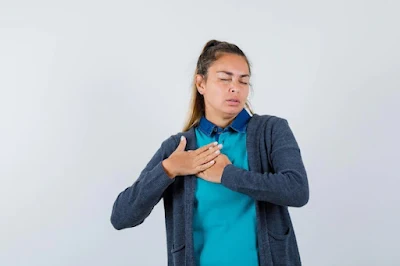In a world where heart disease remains the leading cause of death among women, it is crucial to unmask the silent killer lurking within our midst. While heart attacks are often associated with crushing chest pain in men, the signs of this life-threatening event can manifest differently in women.
Understanding these subtle signs is the key to early detection and potentially saving lives. In this article, we will explore the lesser-known symptoms of a heart attack in women, shedding light on the often overlooked warning signs. From fatigue and jaw pain to shortness of breath and nausea, these seemingly innocuous symptoms can be indicators of a serious cardiac event.
By raising awareness and empowering women to recognize these subtle signs, we can take crucial steps towards prevention, timely medical intervention, and ultimately, a healthier future for all. Join us as we delve into the world of heart health and unravel the mysteries of the silent killer that affects us all.
Understanding heart attacks in women
Heart attacks are not exclusive to men. In fact, they affect women just as much, if not more. However, due to the common misconception that heart attacks primarily occur in men, women's symptoms often go unrecognized and untreated. It's important to understand that heart attacks in women can present with atypical signs, which may lead to delayed diagnosis and treatment.Common Misconceptions about heart attacks in Women
One of the biggest misconceptions surrounding heart attacks in women is the belief that chest pain is the primary symptom. While chest pain can certainly be present, it is not always the case. Women may experience a wide range of symptoms that can be subtle and easily overlooked. These symptoms can include fatigue, shortness of breath, dizziness, nausea, and jaw pain. It's crucial to recognize these subtle signs and seek medical attention promptly.Signs and symptoms of a heart attack in women
The signs and symptoms of a heart attack in women can vary greatly from person to person. It's important to be aware of the subtle signs that may indicate a cardiac event. Fatigue, for instance, is a common symptom experienced by women prior to a heart attack. This fatigue may be more pronounced than usual and can be accompanied by a feeling of weakness or dizziness. Shortness of breath is another common symptom that women may experience, often feeling as though they can't catch their breath or are struggling to breathe deeply. Other symptoms can include chest discomfort or pressure, pain in the jaw or back, and nausea or vomiting.Risk factors for heart attacks in women
Several risk factors contribute to the likelihood of experiencing a heart attack in women. These risk factors can be divided into two categories: modifiable and non-modifiable. Modifiable risk factors include smoking, high blood pressure, high cholesterol, diabetes, obesity, and a sedentary lifestyle. Non-modifiable risk factors include age, family history of heart disease, and certain medical conditions such as polycystic ovary syndrome (PCOS) or autoimmune diseases. It's important for women to be aware of these risk factors and take proactive steps to minimize their impact.How heart attacks in women differ from men
Heart attacks in women often differ from those in men, not only in terms of symptoms but also in the underlying causes. Women are more likely to experience what is known as "silent" heart attacks, where there may be minimal or no symptoms at all. This can lead to delayed diagnosis and treatment, increasing the risk of complications. Additionally, women are more likely to have heart attacks related to coronary microvascular disease, a condition that affects the tiny blood vessels in the heart. It's essential to recognize these gender differences and ensure that women receive appropriate and timely care.Seeking medical help for a suspected heart attack
If you suspect you or someone you know is experiencing a heart attack, it is crucial to seek medical help immediately. Do not ignore or downplay the symptoms, even if they seem subtle or mild. Call emergency services right away and describe the symptoms you or the individual is experiencing. Time is of the essence when it comes to treating a heart attack, and early intervention can greatly improve outcomes.
Preventive measures for heart attacks in women
Prevention is always better than cure, and there are several preventive measures that women can take to reduce their risk of heart attacks. Lifestyle changes play a significant role in preventing heart disease. These changes can include adopting a heart-healthy diet, engaging in regular physical activity, maintaining a healthy weight, managing stress levels, and avoiding smoking and excessive alcohol consumption. Regular check-ups with a healthcare provider are also vital for monitoring blood pressure, cholesterol levels, and overall heart health.Lifestyle changes to reduce the risk of heart attacks in women
Making lifestyle changes is not always easy, but it is essential for reducing the risk of heart attacks in women. Incorporating a heart-healthy diet rich in fruits, vegetables, whole grains, and lean proteins can make a significant impact on cardiovascular health. Engaging in regular physical activity, such as walking, jogging, or swimming, can help maintain a healthy weight and improve overall heart health. Managing stress through relaxation techniques, such as yoga or meditation, can also contribute to a healthier heart.Support and resources for women affected by heart attacks
Recovering from a heart attack can be a challenging journey, both physically and emotionally. It's important for women to know that they are not alone and that there are support and resources available to help them through this difficult time. Support groups, both in-person and online, provide a safe space for women to share their experiences, ask questions, and receive guidance from others who have gone through similar situations. Additionally, healthcare professionals, such as cardiologists and therapists, can provide valuable support and guidance throughout the recovery process.Conclusion
Heart attacks in women are a silent killer that often goes unrecognized due to misconceptions and atypical symptoms. By raising awareness and empowering women to recognize the subtle signs of a heart attack, we can take crucial steps towards prevention, timely medical intervention, and ultimately, a healthier future for all. It's important for women to prioritize their heart health, understand the risk factors, and make necessary lifestyle changes to reduce their chances of experiencing a heart attack. Together, we can unmask the silent killer and save lives.









Comments
Post a Comment
Welcome To Women Steps.